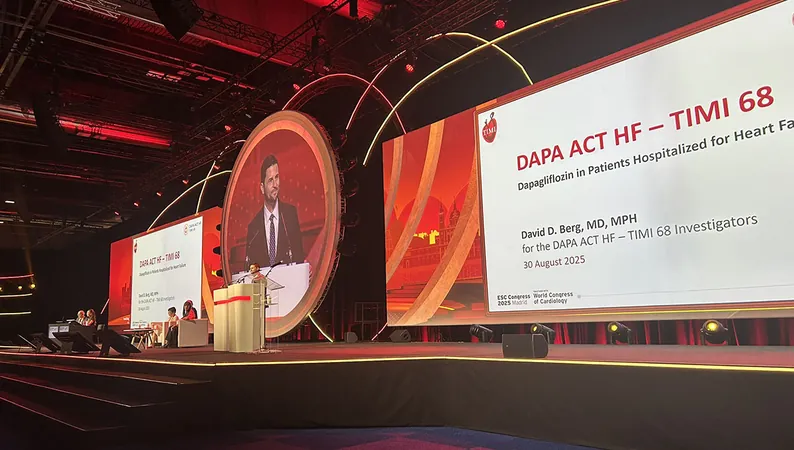
New Evidence Supports Starting SGLT2 Inhibitors During Hospital Stays for Acute Heart Failure
2025-08-30
Author: Nur
Revolutionary Findings at the European Society of Cardiology Congress 2025
MADRID, Spain—Recent discussions at the European Society of Cardiology Congress 2025 have ignited a compelling debate over the benefits of initiating SGLT2 inhibitors in hospitals for patients battling acute heart failure (HF). Despite the DAPA ACT HF – TIMI 68 trial revealing no significant improvement in outcomes, experts advocate for early treatment based on emerging data and trends.
Expert Opinions Argue for Timely Treatment
Dr. David Berg from Brigham and Women’s Hospital highlighted the substantial data suggesting that initiating SGLT2 inhibitors during HF hospitalizations reduces the risks of cardiovascular death and worsening heart failure shortly after discharge. His sentiment was echoed by Dr. Filippo Crea of Catholic University in Rome, emphasizing that early intervention tends to yield better results.
Digging into the DAPA ACT HF – TIMI 68 Trial
Conducted across 210 sites in the U.S., Canada, and Europe, the DAPA ACT HF trial studied 2,401 patients, primarily those with low Ejection Fraction (EF). The findings showed similar rates of adverse events, affirming the safety of dapagliflozin, even though it fell short of demonstrating statistical significance in improving primary outcomes.
A Broader Analysis Reveals Promising Insights
Berg and his colleagues expanded the discussion through a meta-analysis that integrated results from other trials, demonstrating that early SGLT2 treatment correlated with lower risks of cardiovascular death and all-cause mortality. This collective data has reignited enthusiasm among experts to adopt early SGLT2 therapy.
Why Initiating SGLT2 Therapy is a Game Changer
Biykem Bozkurt of Baylor College of Medicine reiterated the safety and efficacy of SGLT2 inhibitors, emphasizing their importance across the spectrum of heart failure management. These insights encourage clinicians to begin SGLT2 therapy during hospitalization as soon as patients stabilize.
A Call to Action for Clinicians
With compelling evidence stacking up, Dr. Berg confidently stated, "We have good motivation to start these therapies in the hospital and no reason not to." As the healthcare community grapples with the complexities of heart failure treatment, the push for early administration of SGLT2 inhibitors presents a pivotal step forward.


 Brasil (PT)
Brasil (PT)
 Canada (EN)
Canada (EN)
 Chile (ES)
Chile (ES)
 Česko (CS)
Česko (CS)
 대한민국 (KO)
대한민국 (KO)
 España (ES)
España (ES)
 France (FR)
France (FR)
 Hong Kong (EN)
Hong Kong (EN)
 Italia (IT)
Italia (IT)
 日本 (JA)
日本 (JA)
 Magyarország (HU)
Magyarország (HU)
 Norge (NO)
Norge (NO)
 Polska (PL)
Polska (PL)
 Schweiz (DE)
Schweiz (DE)
 Singapore (EN)
Singapore (EN)
 Sverige (SV)
Sverige (SV)
 Suomi (FI)
Suomi (FI)
 Türkiye (TR)
Türkiye (TR)
 الإمارات العربية المتحدة (AR)
الإمارات العربية المتحدة (AR)